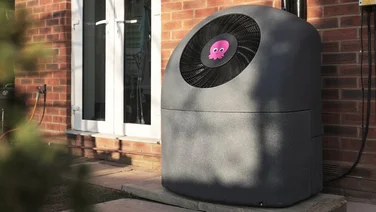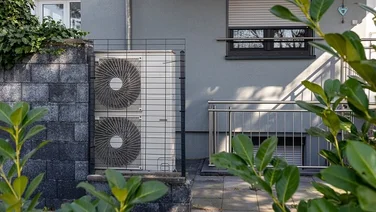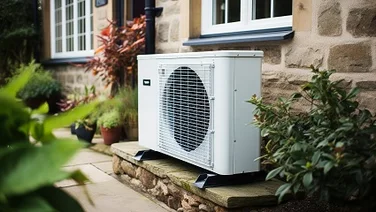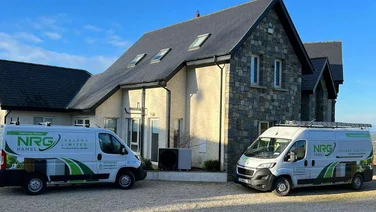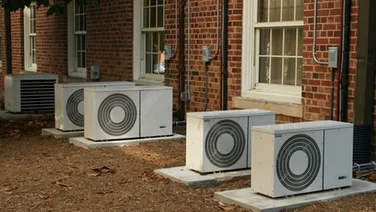- Myth #1 - Heat pumps are too noisy
- Myth #2 - Heat pumps aren't suitable for most homes
- Myth #3 - Heat pumps aren’t efficient during cold winters
- Myth #4 - The upfront cost of heat pumps is too expensive
- Myth #5 - Heat pumps only work with underfloor heating
- Myth #6 - Heat pumps take up a lot of space
- Myth #7 - Heat pumps are expensive to run
- Myth #8 - Heat pumps need to stay on all the time
- Myth #9 - Heat pumps are high maintenance
- Summary
- Heat pumps make about as much noise as a fridge or freezer
- Heat pumps are 2.4 times more efficient than gas boilers during winter
- You can get £7,500 off a heat pump through the Boiler Upgrade Scheme

Installation of the outdoor unit of an air source heat pump
As it stands, less than 1% homes across the UK have heat pumps. However, this is all set to change in the coming years, thanks to the government’s Boiler Upgrade Scheme, which reduces heat pump costs for households all over the country.
As heat pumps gain popularity across the UK, myths about them still persist – but we’re here to prove them wrong. Here to help us put some of these myths and misinformation to bed is Bean Beanland of the Heat Pump Federation, who recently featured on our Positive Energy podcast, ‘What the Hell is a heat pump?‘
“Everybody’s already got heat pumps,” said Beanland.
“All air conditioning systems, it’s just a heat pump. The air conditioning in your car, it’s just a heat pump.
“We’re now getting heat pump tumble dryers, heat pump dishwashers come through. Some coffee machines have got heat pumps in them.”
“The technology is everywhere, we are just very slow to the principle of using it for domestic heat.”
So, if you still have lingering doubts about heat pumps, make sure you read through our myth-busting guide below.
For an quick and accurate quote for a heat pump for your home, just pop a few details into our custom-built tool, and our certified suppliers will be in touch with free quotes.
Myth #1 – Heat pumps are too noisy
This belief stems from when heat pumps first came onto the market – they were big, bulky, and noisy pieces of equipment.
However, after about 20 years of innovation, modern heat pumps are compact, energy efficient, and make barely any noise.
In fact, the legal limit for an air source heat pump unit is 42 decibels, which means that at most, they make about as much noise as a fridge or a gas boiler.
A humming sound comes from the pump’s fan, which pulls air into the system. If these parts are installed incorrectly, you might hear more noise. A good way to avoid this, is to have your heat pump installed by a certified engineer.
You’re also more likely to notice the noise if you’re living in a block of flats, and have an outdoor unit mounted on your wall. However, ground source heat pumps are more popular for these types of buildings, which means you can easily avoid this issue.
If you do notice an excessive amount of noise, this might mean that there’s a problem with the heat pump.
You can read more about this on our how noisy are heat pumps page.
Myth #2 – Heat pumps aren’t suitable for most homes
This is a really persistent myth, particularly in the UK where our housing stock is infamously old and poorly insulated. The truth is that heat pumps can be installed in most types of properties found in the UK – from detached houses to high-rise flats, and modern homes to old farmhouses.
As Bean Beanland told The Eco Experts: “If a building can be heated with a boiler, it can be heated with a heat pump.”
There are, however, a few things you’ll need to be aware of before installing a heat pump in your home:
- You’ll need some garden space to install a ground source heat pump. If you don’t have this, an air source heat pump will be a good alternative, as you can mount it to an external wall
- You should always check whether you’re required to get planning permission from your local authority before installing a heat pump, especially if you live in a conservation area or listed building
- Improved insulation benefits all heating technologies, including boilers, but is not a prerequisite for a successful heat pump installation
While only a small but growing number of UK homes currently have a heat pump installed – in 2022 for example, just 55,000 were installed – the government plans to accelerate this rapidly to 600,000 a year by 2028.
Myth #3 – Heat pumps aren’t efficient during cold winters
One glance at heat pumps’ actual efficiency is enough to persuade anyone to get one – even with their slight dip during the winter months.
Typically, air source heat pumps have an efficiency rate of 200 – 400%, which means that on average, a heat pump will produce three units of energy for every unit of electricity it absorbs.
In comparison, electric boilers have an efficiency rate of 100% – four times worse than that of heat pumps – while the best gas boilers can only reach 94% efficiency.
But what about during the winter? Admittedly, heat pumps will be affected by cold conditions, typically performing at around 20% less efficiency. But this still makes them at least 2.4 times more efficient than gas boilers during the winter.
What type of central heating do you currently use?
Get startedMyth #4 – The upfront cost of heat pumps is too expensive
We won’t beat around the bush: the upfront cost of installing a heat pump can be pretty steep. The typical cost of an air source heat pump is around £10,000, while the typical cost of a ground source heat pump starts at around £16,000.
But many people already finance a replacement boiler in some way and the transition to a heat pump is a one off cost. Once a property has its first heat pump, the replacement cost is not that different to that for a boiler, but a good heat pump, well configured, should last longer.
As well as this, options for fully financed heat pump transitions are now coming to market, with prices predicted to get cheaper over time. There are also a handful of government heat pump grants available to help make the upfront cost more affordable.
The Boiler Upgrade Scheme (previously called the Clean Heat Grant), runs from April 2022 until 2028 and provides homeowners in England and Wales with £7,500 for a new air or ground source heat pump.
Despite the benefits of the grant, our National Home Energy Survey found that 73% of people were not aware scheme.
It’s not just in the UK, governments around the world have introduced grants and schemes to make heat pump installation more affordable.
Myth #5 – Heat pumps only work with underfloor heating
Before we dispel this myth, it’s important to remember that heat pumps work in a different way to traditional boilers in that they operate in a way that is weather compensated. This means that rather than having peaks and troughs of heat and cold, a heat pump owner’s home will always be warm, and will not experience as many extremes in temperature as you would with a gas boiler.
As they operate at a lower flow temperature – unless needed – heat pumps work more effectively if they’re connected to an underfloor heating system, as this allows heat into the home from a larger surface area. That said, they also work well with radiators.
UCL research analysing gas boiler data suggests the vast majority of gas boilers could be turned down to 55°C, with no loss of efficacy. This is a perfectly sound entry temperature for heat pumps with no radiator changes or underfloor heating required.
A high temperature heat pump only needs to operate at high temperature for a very small proportion of the heating season. Data from the Energy Systems Catapult shows that the loss of overall annual efficiency in such cases is almost too small to measure.

Myth #6 – Heat pumps take up a lot of space
Although heat pumps have a lot of external components – like outdoor units, pipes, and underground loops (only for ground source) – they don’t actually take up that much space.
In fact, the average heat pump is similar in size than a gas boiler.
Typically, you can expect the outside heat pump unit to be around 60cm (2ft) tall, 3ocm (1ft) deep, and around 76cm (2.5ft) wide. In comparison, the smallest boiler Worcester Bosch has ever produced is roughly 67cm (2.2ft) high, 27cm (0.9ft) deep, and 37cm (1.2ft) wide.
As for the pipes? Ground source heat pump loops (also known as heat collectors) are all hidden underground, while air source heat pumps have their pipes running from the unit through the external wall, out of sight.
Myth #7 – Heat pumps are expensive to run
Rather than costing more money, switching from a fossil-fuel boiler to a heat pump will actually save you money in the long run. More specifically, we calculate that you’ll save £4,891 over the heat pump’s lifetime, compared to sticking with a gas boiler.
This mainly comes down to the anticipated rise in the price fossil fuel, which will only go up as the world’s reserves of natural gas become further depleted.
Additional expenditure on insulation and underfloor heating isn’t necessary to achieve savings, but the amount of money you can save will depend on how well-insulated your home is, and whether you’re using underfloor heating or standard-size radiators.
A ground source heat pump’s running costs for a three-bedroom household will typically come to around £939 per year.
The average air source heat pump will cost slightly less to run, although this can vary significantly, depending on where you live in the UK.
Myth #8 – Heat pumps need to stay on all the time
This isn’t a myth at all and is actually true, because this is how heat pumps are designed to operate. Let us explain why.
Heat pumps continuously match heat loss with heat in to provide a constant, even temperature, as opposed to blasting radiators with 70°C when the thermostat demands it – allowing them to go cold, then blasting them again, as traditional gas boilers do.
As a result, heat pumps are ‘always on’ in the sense that they are always ready to react to heat demand at any given set of circumstances e.g. desired indoor temperature, external temperature and heat loss rate.
As a result, heat pumps are much more efficient at delivering an even temperature around the home.
The transition to a heat pump can increase comfort levels in the home because the heating is continuous, rather than being switched on and off to accommodate for temperature.
The heat pump should therefore always be on, but it will just run at a lower flow temperature, which is more cost efficient.
If heat pumps are used in a house with barely any insulation, or old insulation that needs replacing, the building won’t be able to lock in the heat – which is why they might have to stay on all day at a higher flow temperature for some people.
This is also the case with houses that have boilers – but they’re able to blast heat into a home very quickly, which can make poorly-insulated buildings hot for a short period of time.
As with all heating systems, insulation and draft-proofing are essential for keeping the heat you pay for inside your home. Heat pumps are no different, in that they work more efficiently in well-installed buildings that will keep the heat they generate inside your home and save you money on your energy bills.
Want to get a better idea of what it’s like to own an air source heat pump? Check out our case study with Louise, from South London.
Louise had a 12-kilowatt air source heat pump installed to reduce her reliance on fossil fuels, and received £5,000 off the upfront cost through the Boiler Upgrade Scheme. Now, Louise can enjoy a warm, even temperature throughout the house, without fluctuations.
Take a look at the full interview with Louise to learn more.
Myth #9 – Heat pumps are high maintenance
Actually, heat pumps are low maintenance, and here’s why. The most important part of looking after your heat pump is to keep it clean and make sure the airflow isn’t being obstructed.
You also only have to get your heat pump serviced every few years – although, this will depend on the warranty conditions on your system.
Plus, if you look after your heat pump properly, it could last up to 20 years – compared to the average boiler’s lifetime of 15 years.
Want to make sure you’re keeping your heat pump in tip-top condition? Check out our easy-to-follow maintenance checklist.
Summary
- Heat pumps aren’t noisy – in reality, heat pumps are as loud as a standard fridge or freezer.
- They can be installed in any home – heat pumps don’t require planning permission unless you live in a conservation area or listed building.
- They are efficient in winter – the efficiency may drop compared to warmer months, but they still perform better than a gas boiler.
- Heat pumps aren’t costly – the upfront costs of transition to a heat pump are steep, but government grants are available to mitigate the cost by up to £7,500.
- Heat pumps will work without underfloor heating – although underfloor heating makes heat pumps more effective, it isn’t a requirement.
- They are comparatively small – heat pumps are similar in size to a gas boiler.
- Heat pumps aren’t expensive to run – the numbers show that a heat pump is cheaper than both an oil boiler and electric boiler.
- They do stay on all the time – heat pumps compensate for temperature by running at a lower and more cost-efficient flow level.
- Heat pumps are low maintenance – all you need to do is keep it clean and make sure the airflow isn’t obstructed.
Over the next few years, heat pumps will become more commonplace in UK homes – the latest addition to the list of must-have household items, and with the UK government now introducing financial support, people of all sorts of backgrounds will have access to this money-saving tech.
Tempted to get yourself a heat pump? Check out some of our useful guides to picking out the right type of heat pump, down to the perfect model and make – and pop some details into this quick form to receive free quotes from expert installers.


